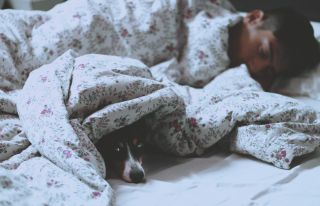Sleep
The Connection Between Sleep Problems and Depression
There are signs and remedies when sleep issues are caused by depression.
Updated January 31, 2024 Reviewed by Tyler Woods
Key points
- Are your sleep problems causing depression? Or are you depressed and that is leading to sleep problems?
- People who are depressed may wake up in the morning with an overwhelming sense of dread or anxiety.
- Some antidepressants have a very sedating effect and help with mood and sleeping at night.

Henry*, a 50-year-old accountant, came into my office bleary-eyed. He told me he hadn’t slept well in months. He described tossing and turning at night and having trouble waking up in the morning. Frequently late for work, his job is now at risk. His marriage is suffering because of his irritability.
“Doctor, I can’t go on like this,” he said. “What can I do to get some shut-eye?”
Diagnosing Sleep Problems
When it comes to diagnosing sleep problems, the question is: what came first? Are your sleep problems causing your depression or are you suffering from depression and that is leading to sleep problems?
Sleep may seem like a passive activity but your body and brain are doing important work—healing and repairing, organizing learning and memories, and energy is being stockpiled so you can face the day ahead Getting too little or too much often affects medical and mental health, relationships, and job stability. Too little sleep impairs concentration, memory, mood, physical performance, and safety. Too much sleep affects productivity, leaving insufficient time to accomplish daily tasks and responsibilities.
Sleep problems are so common that they can often be ignored. As one patient told me, “All of my friends have trouble sleeping.” It's true that about 50 to 70 million Americans have sleep or wakefulness disorders, according to the National Institute of Health, but they should never be ignored.
Acute sleep problems—those that keep you awake because of an anxious situation you’ll be facing the next day or affect you over a brief period of time—can usually be helped by practicing relaxation techniques or taking a sedating antihistamine or a supplement like melatonin.
Sleep disorders that are more persistent and longer lasting aren’t linked to any special anxious situation, and are often caused by depression. People who are depressed find it hard to get to sleep, stay asleep, get back to sleep, and wake up in the morning. Early morning awakening may be accompanied by a special kind of profound existential dread or anxiety. As the day progresses and one gets up and going, this anxiety may dissipate and one may feel much better.
When sleep disturbances are caused by depression, they are usually accompanied by other signs and symptoms of depression, like gloominess, sadness, irritability, and anxiety, and cognitive symptoms, such as having difficulty thinking positive thoughts. These persistent, negative, ruminative thoughts often interfere with concentration, focus, and decision-making. Somatic signs and symptoms include sleep disorder, lack of energy and motivation, decreased sex drive, and a decreased appetite. Taken all together, these form a package that usually makes it pretty easy to diagnose.
Sleep Disorder Treatments
For acute care, one may be prescribed a sedative hypnotic, like Ambien or benzodiazepines. These are best not used by themselves because one can develop a tolerance for them and need higher and higher doses. Instead, when sleep problems are part of a depressive disorder, it is generally recommended that they be treated with antidepressants. It turns out that the same chemicals that mediate mood mediate sleep. By taking an antidepressant, one can limit the amount of the sedating hypnotic needed and, thereby, prevent developing a tolerance for them and make their effectiveness last longer.
There are a number of antidepressants to choose from, with each having pros and cons. Some are especially good for sleep and may be prescribed along with another antidepressant that has slightly different properties. The treatment for depression is very symptom-specific, so, depending on your symptoms, your physician may prescribe a sedating antidepressant in the evening, such as trazadone, and an energizing one, like bupropion, for the morning.
Ruling Out Other Causes for Sleep Disorders
When someone like Henry seeks help from me for sleep problems, I rule out medical conditions that might be the cause. Sleep apnea, restless legs syndrome, and narcolepsy are among the most common sleep disorders.
Sleep apnea, due to an obstruction in the air pathway, causes interrupted breathing and frequent awakenings, and is related to other medical conditions, like high blood pressure, Alzheimer’s disease, diabetes, obesity, heart attacks, and stroke. It's generally advisable for anyone who experiences gasping, loud snoring, and constant awakenings during sleep to stay overnight at a specialized sleep center where breathing, brain waves, and heartbeat are monitored. Treatment for sleep apnea may include the use of a special device or surgery.
Restless Legs Syndrome, a common condition, is characterized by tingling, a prickling sensation, and a constant urge to move one’s legs and feet. These jerky leg movements prevent a restful night’s sleep. Iron supplements, drugs that affect dopamine levels, muscle relaxants, and sleep medications are among the treatments that might be recommended.
Narcolepsy is when someone has frequent “sleep attacks”—suddenly falling into slumber while, perhaps, sitting up. The sleep may last several seconds or up to 30 minutes at various times of the day. While there is no known cure, psychostimulants and antidepressants are among the treatment options your doctor may consider.
In Henry’s case, I failed to detect any medical cause for his sleep problems. Like most of my patients, his sleep deficit and resulting lack of energy was accompanied by a host of other mood, cognitive, and somatic symptoms. His circadian rhythms were out of sync. He could not sleep at night and he couldn't get up in the morning. We focused on developing good sleep habits and finding medication that would help as well.
6 Good Habits for a Better Night's Sleep
Make a commitment to the good sleep habits listed below, and you are likely to see positive results:
- Standardize your sleep cycle. Strictly restrict your sleep hours for bedtime and discourage napping. Go to bed and arise at the same time each day.
- Stick to a bedtime routine. Relax with a cup of non-caffeinated herbal tea, take a warm bath, or read a book in bed. Regular bedtime habits will signal that it's time to sleep.
- Stop screen time. Stop checking your cellphone, working on your computer, or watching a distressing film or TV program an hour before bedtime. Wind down, don't rev up.
- Separate your sleep and work spaces. It's hard to rest if you are staring at all the books and papers you need to review and books you need to read and work on. Keep the area surrounding your bed as calm and Zen-like as possible.
- Exercise daily. Just walking 20 to 30 minutes a day will expend energy, making you more likely to be tired at the end of the day.
- Cut your caffeine, alcohol, chocolate, and nicotine intake from mid-day on. Stay away from stimulants, and you’ll drift into sleep more easily.
Sleep Medications
If improving sleep habits doesn’t do the trick, there are seven classes of sleep medications that can be considered:
- Supplements, like melatonin.
- Antihistamine medications, like Benadryl (diphenhydramine) or chlorpheniramine.
- Non-benzodiazepine "hypnotics," the most well-known of which is zolpidem. Other drugs in this class are zaleplon and eszopiclone.
- Benzodiazepines include triazolam, temazepam, and flurazepam. Anti-anxiety medications which have been prescribed for daytime anxiety can also be used for sleeping aids. They include lorazepam, alprazolam, and clonazepam. The problem with shorter-acting medications, like lorazepam, alprazolam, and triazolam, is that they may help you get to sleep but have a rebound effect, causing you to awaken in the middle of the night when they wear off. On the other hand, they are helpful if you awake in the middle of the night and need to take something to get an extra three to five hours of sleep.
- Antidepressants include some that are sedating, like trazodone, tricyclic anti-depressants like amitriptyline and doxepin, and mirtazapine. They can be taken in the evening so that they both help you get to sleep and improve your mood in the waking hours. One negative is that many have side effects, like weight gain.
- Sedating anti-psychotics help with sleep and calm daytime excitability and ruminative thoughts.
- Mood stabilizers, like neurontin, pregabalin, and, to a lesser extent, lamotrigine, are sedating.
As you can see, there is a lot that can be done to treat sleep problems and depression. Given how crucial sleep is to your well-being, be sure to consult with your health practitioner so you can find the remedy that’s right for you.
To find a therapist near you, visit the Psychology Today Therapy Directory.




